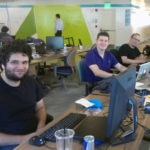"We want to remove barriers so more entrepreneurs can create large-scale Internet of Things projects"
A Colombian startup was set up to help other entrepreneurs speed up their projects in the software creation stage. To do so, they have created a cloud platform to enable tailor-made developments, saving time and costs, and they sell it under the Software as a Service model.

Agustín Peláez, an electronic engineer from UPB, returned to Colombia after having lived for three years in Germany and France, where he worked for EADS Astrium developing a monitoring system for the International Space Station, and he then earned a master's degree in innovation. He later founded Ubidots, a Colombian startup that has combined the Internet of Things and Big Data in a cloud environment.
What is Ubidots all about and what impact do you think these advances have on the hardware startup community?
Ubidots provides a cloud service where each user has a web portal (dashboard) to display the information from their sensors remotely, in a centralized way and in real time. Once the information has been stored, the user can configure actions or customized reports, for example, receive a text message when a refrigerator's temperature is above the permitted level.
This enables the hardware community to focus on developing their products without having to worry about hiring software developers, maintaining a server infrastructure or making tailor-made developments, thus saving time and money.
How did you come up with the idea of offering precisely a cloud service that leverages the Internet of Things?
Upon returning to Colombia I met with some colleagues from college who worked on measuring projects, and we realized that each measuring project had a number of elements in common: sensors, a gateway and a web server. This is how we came up with the idea of taking the web server to the cloud and offering it as a product for other entrepreneurs who wanted to do something similar.
Each new project involved tailor-made software that took months to complete. We wanted to look for tools to speed up the process and we didn't find them on the market. This was the reason for creating a single platform and selling it under the Software as a Service (SaaS) model.
What differences do you find between the entrepreneurship scenario thatenabled Ubidots to be founded in Colombia and the current one?
The technology boom in Colombia has helped us greatly. On the one hand, links have been established with mature innovation ecosystems like the one in Boston, where we were part of the MassChallenge accelerator, and on the other, we can leverage the regional advantages of being in Colombia, such as the incentives to innovation, the culture of innovation in large companies (which encourages investment in technology) and a growing pool of young, enthusiastic and lower-cost talent.

How did you secure funding for the company?
Mainly through sales of IoT projects and hardware and software consultancy. We also receive support from national and regional innovation agencies (Innpulsa y Ruta n).
In how many countries is Ubidots present? What are its short andmedium-term strategies?
We have users in more than 30 countries with very different profiles, from makers who use us in their free time and see us as a hobby, to teachers who use us in class or entrepreneurs who are creating a product and turn to us to launch it, not to mention engineering firms that resell our platform to their large customers.
Our strategy hasn't changed: we want to remove the technical barriers so more entrepreneurs and companies can create large-scale Internet of Things projects.
Where does the Internet of Things stand and what future does this type ofprojects have?
The Internet has typically been confined to the screen of our cell phones and computers. In the future, the Internet will be outside our screen, working for us and enhancing our quality of life in everyday, urban and business aspects.